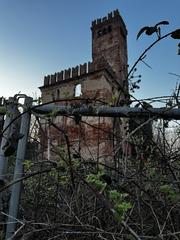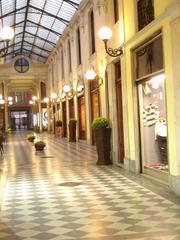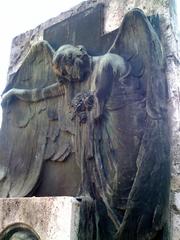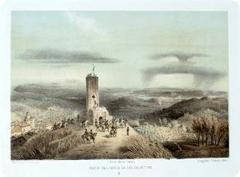Cathedral of Saint Peter and Saint Mark Alessandria: Visiting Hours, Tickets, and Historical Significance
Date: 04/07/2025
Introduction
Situated in the heart of Alessandria, Piedmont, the Cathedral of Saint Peter and Saint Mark (Cattedrale dei Santi Pietro e Marco) stands as a distinguished landmark of religious devotion, architectural grandeur, and civic pride. Founded soon after Alessandria’s establishment in 1168, the cathedral has witnessed centuries of transformation—from its Romanesque origins to its current Neoclassical and Baroque splendor—mirroring the city’s dynamic history and evolving artistic traditions (Italia.it; WildTrips; Spotting History). As the seat of the local Diocese, the cathedral is not only the center of religious life but also a hub for cultural events and community gatherings, offering an immersive experience for all visitors.
This comprehensive guide details the cathedral’s origins, architectural evolution, spiritual and civic significance, as well as practical information on visiting hours, tickets, accessibility, and nearby attractions. Whether you are a history enthusiast, pilgrim, or traveler, this article equips you with everything you need for an enriching visit to Alessandria’s most revered monument.
Table of Contents
- Origins and Early History
- Architectural Evolution
- Religious and Cultural Significance
- Practical Visitor Information
- Artistic and Architectural Highlights
- Summary of Historical Milestones
- Frequently Asked Questions (FAQ)
- Conclusion
- References
Origins and Early History
The Cathedral of Alessandria was constructed soon after the city’s founding in 1168, amidst the conflict between the Holy Roman Empire and the Papacy. Dedicated to Saint Peter, the first cathedral embodied the city’s ecclesiastical allegiance and community identity (Italia.it). Its early Romanesque design set the architectural tone for centuries, serving as a focal point for the burgeoning Christian community.
Architectural Evolution
Medieval to Baroque Transformations
The original Romanesque cathedral, a symbol of Alessandria’s spiritual resilience, was demolished in 1803 during Napoleonic reforms. Construction of the current cathedral began in 1807 and concluded in 1810, embracing Baroque and later Neoclassical features (WildTrips; Understanding Italy). The façade—designed with imposing Corinthian columns and crowned by marble statues—reflects both continuity and reinvention. Renovations in the late 19th century, particularly by architect Edoardo Mella, further enhanced the cathedral’s Neoclassical character.
Notable Features
Inside, visitors are greeted by a lofty nave, intricate vaults, and richly decorated side chapels. Artistic highlights include frescoes by Luigi Morgari, Counter-Reformation paintings by Guglielmo Caccia (Il Moncalvo), a 1546 altarpiece by Callisto da Lodi, and the revered wooden statue “Madonna della Salve.” The bell tower, standing at 106 meters, and the dome adorned with statues, remain defining elements of Alessandria’s skyline (Renato Prosciutto; Citta e Cattedrali). Stained glass windows installed in 1954 and an ornate Baroque choir further enrich the visual narrative.
Religious and Cultural Significance
As the mother church of the Diocese of Alessandria, the cathedral is the epicenter of major liturgical celebrations, including ordinations, feast days of Saints Peter and Mark, and community festivals such as the Saint Baudolino festivities (Guide to Europe). Its role extends beyond worship, encompassing civic ceremonies, concerts, and charitable outreach, thus anchoring the cathedral in Alessandria’s social and spiritual life.
Practical Visitor Information
Visiting Hours
- Monday–Saturday: 9:00 AM – 6:00 PM
- Sunday: 10:00 AM – 5:00 PM
- Special Note: Hours may vary during religious holidays; check the official tourism website for updates.
Tickets and Admission
- Entry: Free of charge; donations are appreciated to support restoration and community programs.
- Guided Tours: Available by prior arrangement through the parish office or local tourism agencies.
Accessibility
- Wheelchair Access: Ramps at main entrances and accessible restrooms available.
- Visitor Assistance: Staff can assist visitors with special needs upon request.
Nearby Attractions and Travel Tips
The cathedral is centrally located, easily reachable on foot from major Alessandria attractions, including the Citadel, Civic Museum, Chiesa di Santa Maria di Castello, and Chiesa di San Lorenzo (WildTrips; Triplyzer). Public transport and parking are available nearby.
Special Events and Tours
The cathedral hosts liturgical celebrations, concerts, and art exhibitions throughout the year. Guided tours delve into its art, architecture, and history. Check the cathedral’s website or local tourism office for schedules.
Artistic and Architectural Highlights
- Façade and Bell Tower: Neoclassical façade with Corinthian columns, marble statues of Christ and the Evangelists, and a bell tower standing 106 meters high (Renato Prosciutto).
- Interior: Spacious nave, Baroque and Neoclassical chapels, frescoes by Luigi Morgari (1926–29), and stained glass windows depicting regional saints (Citta e Cattedrali).
- Artworks: Altarpieces by Callisto da Lodi, Counter-Reformation paintings by Guglielmo Caccia, and the 18th-century “Madonna della Salve.”
- Organ and Choir: Historic 1929 pipe organ and an ornate Baroque choir.
- Historical Layers: Integration of sculptural elements from the 13th-century Church of San Marco.
Summary of Historical Milestones
- 1168: Alessandria founded; original cathedral constructed in Romanesque style.
- 1803: Demolition of the original cathedral under Napoleonic rule.
- 1807–1810: Construction of the current cathedral in Baroque and Neoclassical styles.
- 19th–20th Centuries: Ongoing renovations and artistic enhancements.
- Present: Active center for worship, culture, and community.
Frequently Asked Questions (FAQ)
Q: What are the cathedral’s visiting hours?
A: Monday to Saturday, 9:00 AM–6:00 PM; Sunday, 10:00 AM–5:00 PM. Hours can change on holidays.
Q: Is there an entrance fee?
A: No, entry is free; donations are welcome.
Q: Are guided tours available?
A: Yes, by arrangement with the parish or tourism office.
Q: Is the cathedral accessible for people with disabilities?
A: Yes, it is fully accessible with assistance available.
Q: Can I take photographs inside?
A: Yes, photography without flash is allowed, provided it does not disrupt services.
Q: What are nearby attractions?
A: The Citadel, Civic Museum, Chiesa di Santa Maria di Castello, and local restaurants and cafés.
Conclusion
The Cathedral of Saint Peter and Saint Mark is a cornerstone of Alessandria’s spiritual, artistic, and civic life. Its blend of Romanesque, Baroque, and Neoclassical elements, coupled with a wealth of artistic treasures, makes it a must-visit for anyone exploring Piedmont. The cathedral’s welcoming atmosphere, free admission, and central location ensure accessibility for all, while guided tours and events offer deeper engagement with its rich legacy.
To enhance your visit, consider attending a liturgy or concert, exploring nearby historical sites, and supporting preservation efforts through donations or souvenir purchases. Download the Audiala app for interactive audio guides and real-time updates, and connect via social media for the latest news and special events.
References and Further Reading
- Italia.it – Alessandria
- WildTrips – Alessandria: What to Visit
- Spotting History – Alessandria Cathedral
- Citta e Cattedrali – Cathedral of Saint Peter and Saint Mark
- Guide to Europe – Alessandria
- Renato Prosciutto – Cathedral of Saint Peter Alessandria
- Understanding Italy – Alessandria Province
- Triplyzer – Things to Do in Alessandria
- Diocese of Alessandria




